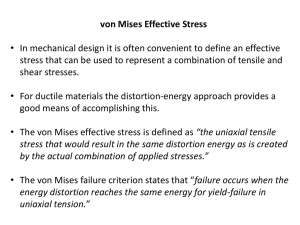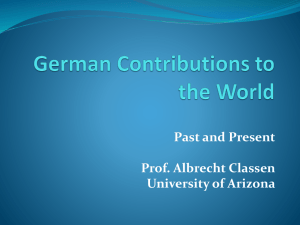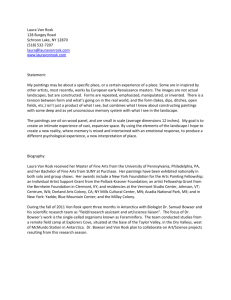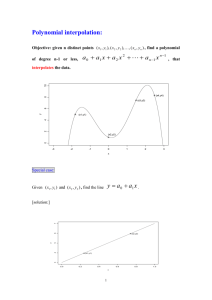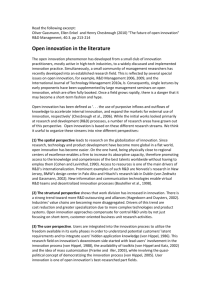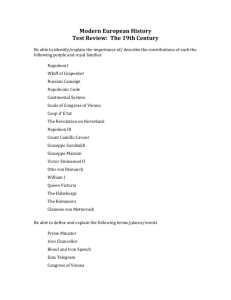Claudia von Werlhof`s text is a document of – quite justified
advertisement
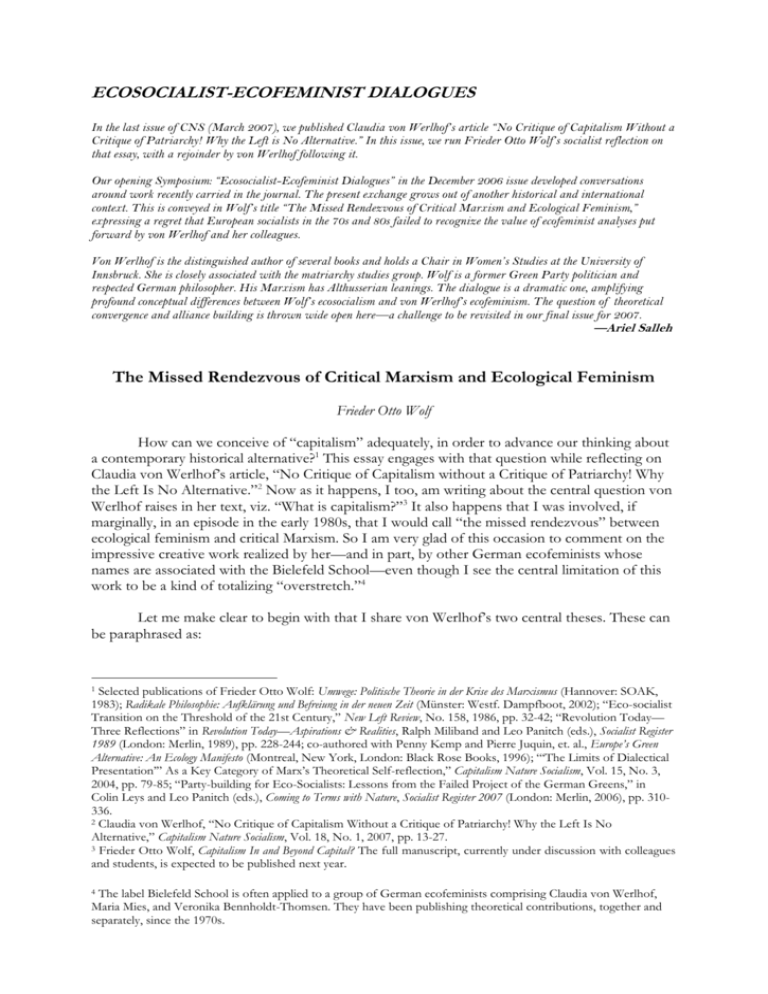
ECOSOCIALIST-ECOFEMINIST DIALOGUES In the last issue of CNS (March 2007), we published Claudia von Werlhof’s article “No Critique of Capitalism Without a Critique of Patriarchy! Why the Left is No Alternative.” In this issue, we run Frieder Otto Wolf’s socialist reflection on that essay, with a rejoinder by von Werlhof following it. Our opening Symposium: “Ecosocialist-Ecofeminist Dialogues” in the December 2006 issue developed conversations around work recently carried in the journal. The present exchange grows out of another historical and international context. This is conveyed in Wolf’s title “The Missed Rendezvous of Critical Marxism and Ecological Feminism,” expressing a regret that European socialists in the 70s and 80s failed to recognize the value of ecofeminist analyses put forward by von Werlhof and her colleagues. Von Werlhof is the distinguished author of several books and holds a Chair in Women’s Studies at the University of Innsbruck. She is closely associated with the matriarchy studies group. Wolf is a former Green Party politician and respected German philosopher. His Marxism has Althusserian leanings. The dialogue is a dramatic one, amplifying profound conceptual differences between Wolf’s ecosocialism and von Werlhof’s ecofeminism. The question of theoretical convergence and alliance building is thrown wide open here—a challenge to be revisited in our final issue for 2007. —Ariel Salleh The Missed Rendezvous of Critical Marxism and Ecological Feminism Frieder Otto Wolf How can we conceive of “capitalism” adequately, in order to advance our thinking about a contemporary historical alternative?1 This essay engages with that question while reflecting on Claudia von Werlhof’s article, “No Critique of Capitalism without a Critique of Patriarchy! Why the Left Is No Alternative.”2 Now as it happens, I too, am writing about the central question von Werlhof raises in her text, viz. “What is capitalism?”3 It also happens that I was involved, if marginally, in an episode in the early 1980s, that I would call “the missed rendezvous” between ecological feminism and critical Marxism. So I am very glad of this occasion to comment on the impressive creative work realized by her—and in part, by other German ecofeminists whose names are associated with the Bielefeld School—even though I see the central limitation of this work to be a kind of totalizing “overstretch.”4 Let me make clear to begin with that I share von Werlhof’s two central theses. These can be paraphrased as: Selected publications of Frieder Otto Wolf: Umwege: Politische Theorie in der Krise des Marxismus (Hannover: SOAK, 1983); Radikale Philosophie: Aufklärung und Befreiung in der neuen Zeit (Münster: Westf. Dampfboot, 2002); “Eco-socialist Transition on the Threshold of the 21st Century,” New Left Review, No. 158, 1986, pp. 32-42; “Revolution Today— Three Reflections” in Revolution Today—Aspirations & Realities, Ralph Miliband and Leo Panitch (eds.), Socialist Register 1989 (London: Merlin, 1989), pp. 228-244; co-authored with Penny Kemp and Pierre Juquin, et. al., Europe’s Green Alternative: An Ecology Manifesto (Montreal, New York, London: Black Rose Books, 1996); “‘The Limits of Dialectical Presentation’” As a Key Category of Marx’s Theoretical Self-reflection,” Capitalism Nature Socialism, Vol. 15, No. 3, 2004, pp. 79-85; “Party-building for Eco-Socialists: Lessons from the Failed Project of the German Greens,” in Colin Leys and Leo Panitch (eds.), Coming to Terms with Nature, Socialist Register 2007 (London: Merlin, 2006), pp. 310336. 2 Claudia von Werlhof, “No Critique of Capitalism Without a Critique of Patriarchy! Why the Left Is No Alternative,” Capitalism Nature Socialism, Vol. 18, No. 1, 2007, pp. 13-27. 3 Frieder Otto Wolf, Capitalism In and Beyond Capital? The full manuscript, currently under discussion with colleagues and students, is expected to be published next year. 1 The label Bielefeld School is often applied to a group of German ecofeminists comprising Claudia von Werlhof, Maria Mies, and Veronika Bennholdt-Thomsen. They have been publishing theoretical contributions, together and separately, since the 1970s. 4 1) There can be no valid critique of “capitalism” without a critique of “patriarchy”— taken in the sense of male-dominated gender relations. 2) The search for an alternative to the present world constellation of modes of domination has to look beyond overcoming the capitalist mode of production by a socialist transition towards communism. Our idea of an alternative must integrate at the very least ecological and feminist critiques and be committed to overcoming all forms of domination as our common aim. I would, however, give a different theoretical interpretation to these two epistemological and political requirements—a different perspective on alliances to be built, which movements should be involved, and how links might be usefully constructed. This critique of von Werlhof’s essay does not challenge the value and validity of these basic insights. Aside from its many insights, which I shall evaluate shortly, von Werlhof’s text also documents a justified frustration. This aspect may or may not contribute to making it a forwardlooking and dependable resource for present and future political debates. Nevertheless, it is true that something important did go wrong in our past political conversations, and the standpoint of ecological feminism that she represents was treated unfairly. There is no doubt about this, and Marxism, as well as critical Marxism—at least in Germany—was actively involved in this failed communication. Claudia von Werlhof is right in asking that these matters be redressed. I am not convinced, though, that the perspective von Werlhof is proposing offers us a sufficiently productive way to achieve that redress. To put a complex matter simply: she in her own way—in important respects—repeats some of the basic mistakes that critical Marxism committed in dealing with ecological feminism. She tends to advocate another theoretical monism, falsely reductive of the complexity and the contingencies of human history. She also supplants, as it were, a feminized idea of “partisanship” that is no less destructive of the possibilities of rational argument than its Leninist or Stalinist predecessor was. To say this is not to deny the value of her theoretical intervention, which carries a number of substantial and specific insights. But my observation does imply a limit to their usefulness. I am suggesting that the way in which she makes her argument could lead some readers to misunderstand the meaning of her own contributions in important ways. Perhaps it is useful for understanding and overcoming these shortcomings to go back to the “missed rendezvous” between Marxism and ecological feminism in 1980s Germany. This can be studied in a nutshell in the jubilee edition of our journal Probleme des Klassenkampfs: Zeitschrift für politische Ökonomie und sozialistische Politik (PROKLA). Already, in close cooperation with Veronika Bennholdt-Thomsen and Maria Mies, Claudia von Werlhof had published significant work on German ecofeminism.5 Then, however, three Marxist feminists linked to the journal—Marianne The most important of these have been: Claudia von Werlhof, “Sexualität und Ökonomie: Über den Zusammenhang zwischen Frauenmisshandlung und Klassengesellschaft,” in J. Kerscher (ed), Konfliktfeld Sexualität (Neuwied/Darmstadt: Luchterhand, 1977), pp. 18-32; Claudia von Von Werlhof, “Frauenarbeit: Der blinde Fleck in der Kritik der politischen Ökonomie” in Beiträge zur feministischen Theorie und Praxis, No. 1: Erste Orientierungen München: Frauenoffensive, 1978, pp.18-32; Maria Mies, “Methodische Postulate zur Frauenforschung – dargestellt am Beispiel der Gewalt gegen Frauen,” Beiträge zur feministischen Theorie und Praxis, No. 1: Erste Orientierungen, München Frauenoffensive, 1978, pp. 41-63; Veronika Bennholdt-Thomsen, “Subsistenzproduktion und erweiterte Reproduktion: ein Beitrag zur Produktionsweisendiskussion,” Gesellschaft: Beiträge zur Marxschen Theorie, No. 14, Frankfurt a. M.: Suhrkamp, 1981; Veronika Bennholdt-Thomsen, Maria Mies, and Claudia von Werlhof, Frauen, die letzte Kolonie in Technologie und Politik, No. 20, Zukunft der Arbeit 4 (Reinbek: Rowohlt, 1983a) [in English: Women, the Last Colony (London: Zed Books, 1988)]; Claudia von Werlhof, “Hausfrauisierung der Arbeit: Die Krise” in (1983a) ibid., pp. 34-43; Claudia von Werlhof, Wenn die Bauern wiederkommen: Frauen, Arbeit und Agrobusiness in Venezuela (Bremen: Periferia/CON, 1985); and Maria Mies, Patriarchy and Accumulation on a World Scale: Women and the International Division of Labor (London: Zed Books, 1986). 5 Braig, Carola Lentz, and Ursula Beer—published a critique of the “Bielefeld approach” that provoked a rather irritated response from von Werlhof.6 As she wrote then, in my rough literal translation: Um so verblüffender finde ich es, mit welcher Unbeirrbarkeit Du Deinen ganzen Aufsatz über imstande bist, sowohl meine Fragestellung, wie auch deren Beantwortung einfach zu verschweigen, und darüber hinaus das, was Du an Aussagen bringst, gleichzeitig‚von den Füßen’ zurück ‚auf den Kopf’ zu stellen. Even more striking I find your unerring ability, throughout your whole essay, not only simply to remain silent about the questions I raise, as well as about my answers to them, but furthermore to reverse simultaneously everything you report about my propositions, by putting it “upon its head” instead of “upon its feet.”7 Von Werlhof’s reaction was understandable, as the standards of criticism invoked by Braig, Lentz, and Beer, were, on the one hand, a continuation of Engels’ historicism and his extension of the claims of historical materialism into the field of gender relations. While on the other hand, they invoked a rather thin criticism of the transdisciplinary character of von Werlhof’s considerations in the name of a narrow disciplinary rationality embedded in established sociological, ethnological, economic, and psychological research. I want to emphasize that nobody then engaged in this exchange seemed to have perceived that a better understanding of the limits of critical Marxism might be gained from the important insights into ecological and gendered reproduction processes contained in the Bielefeld contributions. And nobody at PROKLA was ready to see that von Werlhof’s hypothesis on the rise of the housewife model—”Hausfrauisierung”—has been, in fact, one of the most powerful prognostic and heuristic instruments formulated in the social and human sciences. I saw some of this potential in 1983 but was not able to articulate my conviction in a way that was persuasive to others.8 II Before addressing Claudia von Werlhof's recent text “Why the Left is No Alternative,” I would like to explore an alternative to her proposal to dump existing traditions of critical theory, especially critical Marxism. This is to invite a thorough renewal of the Marxist contribution to critical thinking, which is embedded in a redefined practice of radical philosophy. To this end, I will sketch four elementary requirements, or moves, that I think are required on the side of critical Marxism to correct its own dogmatic shortcomings. Had these moves occurred back in 1983, they might have made constructive dialogue possible. Today they may help us find a way beyond a rigidly structuralized confrontation of ecofeminism and Marxism. Ursula Beer, “Marx auf die Füße gestellt? Zum theoretischen Entwurf von Claudia von Werlhof,” PROKLA/Probleme des Klassenkampfs: Zeitschrift für politische Ökonomie und sozialistische Politik, 1983, No. 50, pp. 22-36; Marianne Braig and Carola Lentz, “Wider die Enthistorisierung der Marxschen Werttheorie: Kritische Anmerkungen zur Kategorie: ‘Subsistenzproduktion,’” PROKLA/Probleme des Klassenkampfs: Zeitschrift für politische Ökonomie und sozialistische Politik, No. 50, 1983, pp. 5-21. 7 “Lohn ist ein ‘Wert,’ Leben nicht? Auseinandersetzung mit einer ‘linken’ Frau. Eine Replik auf Ursula Beer,” PROKLA/Probleme des Klassenkampfs: Zeitschrift für politische Ökonomie und sozialistische Politik, 1983, No. 50, pp. 38-58 (Trans. Frieder Otto Wolf, 12/29/06). 8 For example, in Moderne Zeiten, a monthly socialist journal that I co-edited then, I tried unsuccessfully to draw the contribution of the Bielefeld group and other feminist thinkers into debates on the ecological renewal of Marxist politics. See Jutta Kolckenbrock-Netz, “Frauen in der Politik und/oder autonome Politik der Frauen,” Moderne Zeiten: Sozialistisches Magazin 1983, No. 6/7, pp. 33-37, and later, Verena Krieger, “Radikale Gleichstellungsforderung, Systemgrenzen und feministische Politik in den Grünen,” Grünes und alternatives Jahrbuch 1986/87 (Berlin: VAS in der Elefantenpress, 1986), pp. 92-100; Steffi Engert, “(Grün-) Feministische Postmoderne oder Krise als Chance” in Erwin Jurtschitsch, Alexander Rudnick, and Frieder Otto Wolf (eds.), Grünes & alternatives Jahrbuch 1988: Grüne Perspektiven, (Köln: Kölner Volksblatt Verlag 1988), pp. 223-230. 6 First move: As Althusser has reminded us, it is important to explicitly acknowledge that Marxism itself is a finite theory.9 Moreover, insofar as it develops as scientific theory, Marxism addresses definite and finite “objects of knowledge,” which under no circumstances grasp the totality of “real objects.” Second move: It is useful to concede that theoretical debate on the concept of the “mode of production” has to be specifically referred back to the only historical example that has been extensively, although not exhaustively, analyzed by Marx in Capital. In other words, it should be admitted that “historical materialism” is not a comprehensive theory of history to be applied to particular historical processes. It is some heuristic philosophical conclusions drawn from analysis of the capitalist mode of production (CMP) and its specific contradictions. In particular, Marx’s theory elided the gender dimension presupposed by the central world historical fact underlying capitalist wage labor (Capital, Vol. I, Ch. 4, Sect. 3—cf. von Werlhof’s classic critique from 1978).10 In addition, the reproduction cycle of the “metamorphoses” of capitalist wage labor was not developed by Marx. This was because the consumption of the worker “is not a part of the circulation of capital,” although “continuous existence of the working class is required for the capitalist class” (Capital, Vol. II, Ch. 2) and “Individual consumption … is only presupposed as a societal act, not as an act of the individual capitalist” (ibid., Ch. 3). Had Marx tackled these matters, he would have raised a number of problems regarding the interlocking of gender relations and capitalist exploitation. Third move: It is helpful to realize that the very concept of “domination” used by Marx in characterizing the relation between the CMP and “modern bourgeois societies” has to be taken seriously as a specific object of theoretical inquiry. This implies that it cannot be eliminated by falsely postulating an identity between the CMP and these societies. Concrete “capitalisms,” such as modern bourgeois societies dominated by the CMP, concretely located in space and time have to be distinguished from the general structure of the CMP as such. The CMP dominates concrete capitalisms by being embodied within their reproduction processes conducive for the accumulation of capital, but at the same time, the practice of articulating this category of domination should not be misunderstood as claiming an explanatory monopoly over all concrete processes within modern bourgeois societies. Nor does it follow that there is an automatic preeminence of the two competing “classical processes” of the “production of surplus value” characteristic of the CMP. By these I mean the production of absolute and relative surplus value, which are essential for understanding what has been at stake within historical struggles for the normal working day. Along with Rosa Luxemburg, Maria Mies, and more recently David Harvey, von Werlhof pertinently reminds us of the important fact that capitalist accumulation cannot continue without dispossession/expropriation.11 Additionally, or even preeminently, this is so whenever such an Louis Althusser, “Le Marxisme Comme Theorie ‘Finie’” [1978], in Yves Sintomer (ed.), Louis Althusser: Solitude de Machiavel et autres textes (Paris: PUF, 1998), pp. 281-296. 10 Claudia von Werlhof, “Frauenarbeit: Der blinde Fleck in der Kritik der politischen Ökonomie,” Beiträge zur feministischen Theorie und Praxis, 1: Erste Orientierungen. München: Frauenoffensive, 1978, pp. 18-32. 11 Rosa Luxemburg, The Accumulation of Capital, trans. A. Schwarzschild (London: Routledge, 1951); Maria Mies, 1986, op. cit.; David Harvey, The New Imperialism (Oxford: Oxford University Press, 2005). 12 Some ecologists, like Hans Immler, Marx und die Naturfrage: Ein Wissenschaftsstreit (Hamburg: VSA, 1984), have seen this as a reason to abandon Marx’s theory of the CMP in favor of theories about the intrinsic value of nature. Such a move is neither specifically helpful for understanding the complexities of an ecologically sustainable use of energies, processes or qualities, nor does it advance our understanding of the specifics of capitalist exploitation or the struggles that it unavoidably brings about. On the contrary, it leaves us unarmed against the established arrogance of mainstream economics. 9 expropriation can be successfully pushed through in actual fact, as for example in present processes of redefining intellectual property rights by way of international trade agreements that facilitate the transfer of public and indigenous resources to transnational corporations. This mechanism of “accumulation by dispossession,” as Harvey characterizes it, should not, however, be misunderstood as a substitution or replacement of those processes of surplus value production that continue to be the specific “engine” of capitalist accumulation—an engine that it does not share with other modes of production. Fourth move: it has to be understood and theoretically articulated that the critical Marxist analysis of the CMP only refers to certain dimensions of the reproduction processes in these societies. By this I mean those processes directly involved in the accumulation of capital that are based on the exploitation of labor power bought as a commodity. This opens our theoretical debate to the observation that there are other aspects that require an analysis in other theoretical terms—like, of course, the biospherical conditions of human livelihoods.12 Likewise, gendered relations of reproduction between human beings warrant closer examination. Claudia von Werlhof has the merit of having been a pioneer in pointing out the “abstraction” from gender relations within the household in Marx’s central argument about the “world historical fact” of the existence of labor power as a commodity. Although I would suggest that she then erred in her further development of this by postulating a modification of the theory of value and exploitation. In my view, it is counterproductive to introduce this dimension into the theory of CMP rather than approach it as an “overdetermination” of the societal domination of the CMP by male-dominated gender relations, which impose officially “invisible” workloads upon women, while setting up men—especially male householders—as “chiefs.” The relation between such distinct fields of structural causality can be described in terms of “overdetermination,” although some on the Left have taken this too far.13 In any event, it seems evident to me—and I agree with von Werlhof—that societal production outside of commodity production should not be seen “as a fallback into underdevelopment” as so many Marxists like to treat it. But here more discussion is needed between critical Marxists and ecofeminists on how far such production geared towards the satisfaction of given needs should be categorized uniformly as “subsistence production” without distinguishing in some way between “rich” and “poor” societies and between production of the means for life, on the one hand, and the production of life itself, on the other. Against these background concerns, the ecofeminist perspective on advancing a “different relation to nature” does not seem in any way “romantic,” as is so often charged by unsympathetic readers, but simply good sense in the face of human “political ecologies” that are patently self-destructive in the long run. The patriarchal metaphor of “dominating nature” has, in fact, never been adequate as a description of relations occurring in between human metabolisms and biospherical reproduction processes. This has been understood by Bacon and, of course, by Marx. Even though Bacon has authored a number of “macho” formulations about dominating nature, he never contested the fact that only by obeying nature can it be put to use for human A somewhat “overdeterminist” line of Marxist analysis has been developing around the journal Rethinking Marxism. See for example, the collection of essays edited by Stephen Resnick and Richard Wolff, New Departures in Marxian Theory, (London: Routledge, 2006), as well as Harriett Fraad, Stephen Resnick, and Richard Wolff (eds.), Bringing It All Back Home (London: Pluto, 1994), or Antonio Callari and David Ruccio, Postmodern Materialism and the Future of Marxist Theory: Essays in the Althusserian Tradition (London: Wesleyan University Press, 1996). Against this, I think it is important to stress that relations of overdetermination are not to be constructed as automatically totalizing: Not all processes are overdetermined by all other processes, only some processes by some others. 13 purposes.14 And for Marx, the idea of private property over a piece of nature is an absurdity to be replaced by usufruct, obliging the user—individually as well as collectively—to practice careful stewardship and improvement.15 Likewise, the urgent need for a transformation of existing maledominated gender relations cannot be denied by a political Left that still holds to the objectives of liberation and emancipation. The same might be said about the critique of machinery and technology, another central preoccupation of von Werlhof. Her position is obviously true, insofar as machines and technology function as “objectified” instruments of domination. Thus, in Capital, Marx claims the technical inventions of past decades to have been just “instruments of war” against the working classes.16 Such instruments certainly have to be criticized and fought against. Moreover, any Marxist criticism of the ecological feminist aim of overcoming all kinds of domination as “anarchistic” is, of course, a self-caricature of the Left. What can be criticized in anarchism is not this political objective—one that was actually shared by Marx and Engels. It is, rather, the anarchists’ lack of interest in questions of strategy: What transformative processes are needed to get from here to there, and how to build the political power base needed to bring them about? In any case, a theoretical effort taking up what has been valuable in the Marxist and left-wing traditions will have to join in debate with all those for whom the demand is “freedom from all domination.” And, those who claim to continue the liberating project of Marx should remember that one of his central postulates was the withering away of the state. In this respect, again, I would agree with von Werlhof’s diagnosis. A Left that has given up on human liberation by taking an affirmatively statist stance—which is implicitly patriarchal and anti-ecological—will only be found among those who have given up on societal transformation.17 We will need some careful re-thinking to break the vicious cycle that has brought emancipatory theorizing into a self-destructive sequence—from the indifferent pluralism of the modernization theory of the early 1960s, via the dogmatic monism of renewed Marxism, Feminism and Ecologism in the late 1960s, to the postmodern indifferentism dominant within cultural studies since the late 1980s. We will need to examine the variety of “contradictions,” or movements, addressing the variegated dimensions of domination. And we will need to attend to what “specific materiality” can be brought to bear in a perspective on the cognitive unity of the objects of struggle, so as to achieve forms of solidarity that don’t rely upon subordinating others. Beyond this, our generation—which has lived through periods of continued cultural turns and epistemological discontinuities—has to fulfil its historical obligation to write an intelligible intellectual history of these complicated processes, one not limited to the national perspective. III I shall now try to concretize these four proposed moves by translating Claudia von Werlhof’s theses into challenges for the renewal of a comprehensive critical theory instead of interpreting them at their face value—as another farewell—to not only the foundations of both right-wing “For we cannot command nature except by obeying her.” Francis Bacon, Novum Organum, Bk. I, Aphorism 38, cf. Aphorism 3. 15 Karl Marx, Capital, Vol. III, Ch. 46 (Marx Engels Werke, Vol. 25, 784): “Vom Standpunkt einer höhern ökonomischen Gesellschaftsformation wird das Privateigentum einzelner Individuen am Erdball ganz so abgeschmackt erscheinen wie das Privateigentum eines Menschen an einem andern Menschen. Selbst eine ganze Gesellschaft, eine Nation, ja alle gleichzeitigen Gesellschaften zusammengenommen, sind nicht Eigentümer der Erde. Sie sind nur ihre Besitzer, ihre Nutznießer, und haben sie als boni patres familias den nachfolgenden Generationen verbessert zu hinterlassen.” 16 Karl Marx, Capital, Vol. I, Ch. 13, Sect. 5 (Marx Engels Werke, Vol. 23, 459): “Man könnte eine ganze Geschichte der Erfindungen seit 1830 schreiben, die bloß als Kriegsmittel des Kapitals wider Arbeiteremeuten ins Leben traten. Wir erinnern vor allem an die selfacting mule, weil sie eine neue Epoche des automatischen Systems eröffnet.” 17 Even Stalinists swore that the reinforcement of the state was just a transitory expediency! 14 and left-wing politics, but also the foundations of modern science.18 For von Werlhof claims to have arrived—together with others of the Bielefeld group—at a new and more comprehensive understanding of “capitalism” that supercedes the one formulated by Marx. In this she is more radical than the “stage theorists,” who since Bernstein have relegated Marx to the 19th century.19 She does not relegate Marx’s analysis to the past but formulates a serious theoretical argument for theoretically advancing beyond Marx’s theory—claiming the present and the future for her position. The point could easily be made here that Marx was not speaking about “capitalism” but the “capitalist mode of production”—two constructs that could well describe distinct theoretical objects. But this would miss the point of von Werlhof’s substantial argument. She explicitly addresses key concepts like the “accumulation of capital,” the “capitalist mode of production,” and the “development of the productive forces.” She also offers a diagnosis of reasons for the present ecological disaster. However, I believe that her general line is less than convincing for two reasons. First, it is doubtful that the “normal wage labor relation” is tending to vanish, as von Werlhof affirms without any hesitation. This would be a truism, indeed, if we identified such a relation simply with the mainly male labor force regulated within “fordism,” since with the passing of fordism, “fordist labor” is effectively vanishing. But it simply does not follow that this means the end of wage labor, which is empirically extending on a global scale. And I do not see that it would imply an end to all class compromise achieved so far, not just in the short era of fordism. Neoliberal politics is working hard at this, it is true; but it takes two to tango. Even weakened, fragmented and precarious wage laborers will continue to be capable of resisting their exploitation by capital, and they will succeed, to some degree, in imposing some regulation of wage labor. I would even be so skeptical as to assert that neoliberal demolition strategies will not be capable of destroying all the existing internally contradictory and ambiguous institutionalized class compromises achieved since the 19th century struggles for normalization of the working day. For that matter, the neoliberal project may not even totally undercut the 20th century struggles for the regulation of working conditions or the labor market. This includes the attacks of capital on hard won social security measures, covering the main risks to reproduction inherent in labor power as a commodity. Regarding von Werlhof’s “hausfrauisierung” thesis, it is probably true that within wage labor, the differences in situations between more or less “guaranteed” types of wage labor and “precarious” forms of wage labor are increasing. It is also probably true that forms of dependent labor in transition to wage labor directly exploited by capital are gaining in importance again. Most people seem to have forgotten that Marx was convinced20 that the inherently precarious “wage by pieces,” or “stücklohn,” which developed from the transitory form of proto-capitalist cottage industry, was the most adequate form for capitalist exploitation. It is far less evident that the amount of labor not directly exploited by capital is also growing in parallel, although statistical estimates of the many sorts of wage labor for the reproduction of human societies are quite inadequate. There seems to be no predictable outcome of this kind of struggle between the capitalist economy permeating the global slums or most of the global countryside and the caring economy in the broadest sense, which encompasses 18 Claudia von Werlhof, op. cit., 2007, p. 13. 19The most influential (and in many ways most woolly) recent example of such a stage theory relegating Marx to the 19th century while accepting his validity then—and therefore missing the point of his critique of political economy—is found in Antonio Negri and Michael Hardt, Empire (Cambridge, MA: Harvard University Press, 2000). 20 Karl Marx, Capital, Vol. I, Ch. 19 (Marx Engels Werke, Vol. 23, 580): “Aus der bisherigen Darstellung ergibt sich, daß der Stücklohn die der kapitalistischen Produktionsweise entsprechendste Form des Arbeitslohns ist.” biospherical as well as human reproduction and continues to occupy the major part of overall socially necessary human labor throughout the world. In fact, however, as the Bielefeld group and other ecofeminist theorists argue, this labor continuously serves to reproduce crucial elements needed for capitalist accumulation—particularly the existence of a sufficient supply of labor power, in the form of a commodity, on the labor market as well as the “bits of the biosphere” that are claimed as private property. Even when these presupposed labor forces are threatened or made fragile in terms of their long-term availability, capitalist accumulation itself may be doing relatively well as long as sufficient fresh supplies are available to be immediately exploited—as a source of surplus value in the case of labor power and as a continuing condition of capitalist production in the case of “landed property.” Due to the leaps in investment-saving technology that have taken place in the fields of information and communication in the last decades, the crisis of capital accumulation is, so far, limited to its “classical” internal contradictions.21 The crisis of reproduction could, in fact, provide an extra momentum to capitalist accumulation, which tends to run far more smoothly on the basis of extra profits and dispossessions linked to the integration of ever more new subjects of labor into the clutches of its direct exploitation. Insofar as capital would appropriate the still existing forms of feudally dependent labor, slave labor, and the dependent household labor of women into its internal exploitation processes, it would multiply its chances for surplus production. This option is limited by the internal contradictions of capital, whether they be overaccumulation or underconsumption, each of which makes for mass unemployment and maintains the predominance of finance capital. China and Eastern Europe are currently illustrating this thirst of capital for “new labor power” to activate the production of surplus value. In American history, this “respect” of capital accumulation for pre-capitalist forms—i.e. slavery—has paradigmatically shown its specific limits. It is inevitable that it will become advantageous to capital to subsume such subjects of labor more directly to its own kind of exploitation, as personally dependent slaves, or “free wage labor.” And then something will be done about it, abolishing subsisting pre-capitalist forms of labor to make way for more specifically capitalist exploitation as wage labor. But this is not a uniform and synchronized, nor even irreversible, process. It depends on the most profitable constellations to be realized in a given historical situation. So I would disagree with von Werlhof that the aim of capital is simply “the transformation of all labor into wage labor.” Rather, its exclusive aim is profit on capital, assuring the accumulation of capital. Everything else may or may not be an adequate instrument for achieving this—always, under specific conditions to be looked into. And the direct subsumption of wage labor is just one of these instruments. Furthermore, although the reality of violence and war within capitalism are undeniable, I suggest that von Werlhof’s oversimplified equation of exploitation, violence, and war obscures any specific understanding of the exploitation of wage labor by capital. It equally obscures analysis of the role of technology within the context of the method of producing relative surplus value, of machinery and the factory. All these are, in fact, forms of domination, not just “economic exchange relations,” and they are specifically mediated not by direct violence but by structural domination. That is, wage laborers are not slaves, although the difference may be reduced to the “theoretical” possibility of legally changing their exploiter. Likewise, not all technology is weaponry, although some of it has been developed as an “instrument of warfare” against worker resistance or against “nature striking back.” Factories are not barracks determined by despotic hierarchies; they are also arenas of cooperation with some Compare the important analysis of the recent history of capital accumulation on a world scale contained in Robert Brenner, The Economics of Global Turbulence (London: Verso, 2006); see also Robert Brenner, The Boom and the Bubble: The U.S. in the World Economy (London: Verso, 2002). 21 degree of “autonomous” worker control over their own networks of dispatching the workload forced upon them.22 This tendency to reduction and oversimplification, raises the question of what is gained by looking for “one cause,” one “main contradiction”—for example, “life” versus “non-life”— that underlies the present complex of ecological, economic, cultural and political crises. I continue to be convinced that such a reduction of the empirically given plurality of causes does not give us anything useful—except an illusionary idea of unity. Rather, this approach makes us lose the motivation to look for common ground between the different dynamics that operate in reality and the social movements trying to cope with the dominant trends. Claudia von Werlhof argues for a feminist renewal of scientific enquiry on a nonreductionist basis. Who could object to that? The problem for me here lies in the way she conceives its implementation. When she insists that “technological progress, the ‘development’ of industrialized nations, the leading role of the North, the superiority of men over women, have now definitely lost their guiding role”23—the power to orient human actions to a sustainable future—she is certainly right. But this is not the end of the story. Instead of critically distinguishing between the destructive reality and the emancipative potential of the CMP (a task in which Marx sometimes seems to have erred by overestimating the emancipative potential), von Werlhof proposes to abandon critical analysis of what has concretely happened—and is still happening—under industrialization. Instead, she orients us towards a future without any kind of technology and a notion of womanhood harking back only to the “shining” of matriarchy, leaving behind the individualism or the division of labor developed by “Western” and capitalist modernity. Even without sharing Marx’s “optimism” about the emancipative potential contained in this modernity, I remain convinced that his critical project of distinguishing between the contradictory “faces” of the CMP should not be abandoned. We should continue to enquire about the possibility of a practice of science that produces objective insights into reality without lapsing into objectivism or instrumentalism. We should continue looking for the concrete potential that exists for “alliance technologies” in which human stewardship for nature will be combined with human use of “the gift of nature to humanity.”24 We should continue looking towards plural notions of gender re-combining and re-inventing human sexual practices and gendered identities. Insofar as von Werlhof seems to close her eyes before these challenges, she utterly fails to persuade me of the value of the exclusive turn she is giving to her own position. Von Werlhof sees “patriarchy” as the “deeper structure” of capitalism. This is, I am convinced, a profoundly ambivalent formulation. On the one hand, it blinds us to the very real dangers of capitalist accumulation as such—just as it simultaneously threatens to undermine human labor and nature. On the other hand, it misses the difference between different forms of domination, which is a central achievement of Marx. By this I mean that immediately personal forms of domination like patriarchy, slave ownership or feudal appropriation are inseparable from lived relations between dominating and dominated human beings. Conversely, objectively “reified,” impersonal forms of domination—like the wage-capital relationship—really function in separation from the personal relations of those involved. To ignore this groundbreaking difference makes it impossible to understand why capitalist politics historically has always been capable of mobilizing active support for its projects from those oppressed by personal forms of This has been the central point of Cornelius Castoriadis’ critique of theoretical Stalinism in the name of “autogestion.” See Theofanis Tassis, Cornelius Castoriadis: Eine Disposition der Philosophie, PhD thesis, Free University of Berlin, 2006. 23 Von Werlhof, op. cit., 2007, p. 21. 24 Alain Lipietz, Qu’est-ce que l’écologie politique (Paris: La Découverte, 1999). 22 domination—slaves, serfs, and housewives. A recent example of this is the existence of active support from women—and not only career women—for the neoliberal politics of dismantling the fordist “welfare state.” This reflects the neoliberal achievement in casting the welfare state as something explicitly patriarchal, while at the same time obscuring the implicit patriarchal functions of neoliberal strategies that create precarious situations for the majority of women around the world. Against this totalizing thrust of capital, I would maintain that it does not really help Marxists to concretize the “utopia of patriarchy” as “motherlessness,” as von Werlhof does, or to equate “patriarchy” with “progress in its capitalist form.” In my view, “overcoming capitalism as a world system” [die Überwindung des Kapitalismus als Weltsystem] is not identical with overcoming the “global war-system” [globales Kriegssystem]. So it does not “logically follow”—“logischerweise”— that the way to overcome these things can be encapsulated in the strategic metaphor of “getting out, of exiting out of the production of commodities into the subsistence production dominated and largely annihilated by it, in the North as well as in the South” [den Ausstieg aus der Waren—in die von ihr unterworfene und bereits weitgehend vernichtete Subsistenz-Produktion in Nord wie Süd]. It is probably true that the potential of labor carried on beyond the reach of direct capital exploitation has been unduly neglected and should be put to strategic and constructive use.25 But it is not believable that such a mass “exit” could take place without major catastrophes—and so it would tend to remain an affair of small minorities incapable of changing the course of human history. The tasks of transformation and transition, which Marx and Engels have already postulated in their challenge to the anarchists, remain ever more urgent for present day societies worldwide. Claudia von Werlhof’s practice of thinking in terms of abstract unnamed agencies referred to only indirectly as well as creating formulations using the passive mode leaves itself open to being read as a kind of conspiracy theory. Thus, for example, she writes that “it has to be assumed, though, that it was exactly this achievement that caused the well-orchestrated drives, from the Left as much as the Right, to undermine the women’s movement and feminist research”26 More significantly perhaps, this style of theorizing could suggest a lack of interest in one’s own limitations and blind spots. In fact, it would be surprising if the powers defending established structures of domination would not do anything in their power to defeat liberating and emancipative movements. To my mind, the far more interesting question—neglected by this passive mode of denunciation—is the question of why it has been possible to deflect and split the liberation movements in the first place. And this may have to do with things in our own reach or experience—like the historical defeat of the New Left of ’68, with its inability to address internal differences of experience, perspectives and interest, all of which lead nowhere but to interminable splits. Or to take another instance, consider the inability of postmodern intellectuals to relate to our struggles against the neoliberal project of taking political mediations out of capitalist exploitation. Von Werlhof argues that the Left, in contrast to its rhetoric, does not strive for an alternative to the system in which we are living and that it “is not even capable of doing so” [warum die Linke im Gegensatz zu ihrer Rhetorik keine Alternative zu dem System, in dem wir leben, anstrebt, ja gar nicht anstreben kann].27 For one thing, this claim uses a dubious notion of “system,” though See Joel Kovel: The Enemy of Nature: The End of Capitalism or the End of the World? (London: Zed Books, 2002), 225 ff. 26 Von Werlhof, 2007, op. cit., p. 14. 27 Ibid., p. 2 25 that is not the key problem with it. Yet, it should not be difficult to translate her claim into a less problematic formulation that targeted, for example, the present constellation of relations of domination. The notion of an alternative would then be required to be somewhat more complex. But even this would not take the sting out of her charge as to whether the Left is really interested in such an alternative. Rather, the problem as I see it lies in a false unification of positions and movements under the category of “the Left” as well as in the methodology used for exploring such relationships. I would have no qualms about denying this striving for a real alternative to the present situation of domination—if we were discussing, say, Stalinism or Blairite social democracy. But how true is von Werlhof’s claim for the New Left or the present alterglobalization Left? More importantly, can we infer from past failings of trade unions and political parties or past shortcomings of Left theorists the impossibility of fruitful dialogue and cooperation in the future? Do these historical failings necessarily rule out a politics in which critical Marxism and ecological feminism could be brought together in a productive way? Even asking these questions implies a negative answer! The negativity of her approach to an hypostasized Left is exacerbated by the kind of collective depth psychology that von Werlhof applies to the Left. She states: The problem of the Left with regard to the question of the alternative is of an even more fundamental nature than we are presuming anyway. For the Left is not interested in an alternative to “really existing capitalism”—exactly because it is willing to realize the utopia of patriarchy. 28 [Das Problem der Linken bei der Frage nach der Alternative ist also noch viel fundamentaler als ohnehin vermutet. Denn die Linke interessiert sich nicht für eine Alternative zum “real existierenden Kapitalismus,” eben weil er die Utopie des Patriarchats verwirklichen will.] This clearly is an essentialist argument implying that it is part of the essence of the Left not to be interested in such an alternative—to lack that will. Even if we accept the inherent lumping together of the variegated and deeply contradictory spectrum of the historical Left of the 19th and 20th centuries—with all its impressive shortcomings and repeated betrayals of the aims of liberation—the essentialism of this argument is unacceptable. Ours is surely an activist political context where debates always focus on the capacity of individuals and groups to decide otherwise. IV Claudia von Werlhof writes: “The Left is likewise not at all interested in an alternative to patriarchy, because this is solidly anchored in its collective unconscious (Erdheim, 1984).” [Die Linke interessiert sich aber auch nicht für eine Alternative zum Patriarchat überhaupt, weil dieses in ihrer “kollektiven Unbewusstheit” fest verankert ist].29 She has a valid point in highlighting the historical difficulties of the really existing Left in understanding and taking on board the well-founded claims of feminism and ecology. However, in her essentialist and negative diagnosis of the Left and her “farewell” to it, she pushes aside any option for a refounding and recomposition of the Left. In past history, such options have historically been the only ones leading to an effective renewal and reinforcement of liberation struggles. And we recall here the treason of democratic emancipation by the liberals in the French Revolution, the treason of social democratic support for 20th century imperialist wars, and the treason of communists in supporting Stalinism. Thus, I would argue that the option of renewal is brushed aside by von Werlhof’s mixture of ideology theory with psychoanalysis. 28 29 Ibid., p. 2 Ibid., p. 12 Von Werlhof’s essentialist and determinist turn of argument leaves no possibility for critical Marxists to relate to what is claimed about them in her argument here. And whereas even class-reductionist versions of Marxism at least allow for individual “treason,” not even this possibility is considered here: The Left is the Left, and this is its essence. No questions about strategy, about how to change, or how to reconfigure this political stagnation. Further, grounds or reasons for and origins of this “essence” remain undiscussed. Does it derive from the simple fact that so many on the Left have been born male? The reaction of many socialist feminists to such a gender reductionist argument is understandably one of discomfort. But von Werlhof adds that: “What needs to be addressed is the whole, the alterna-depth, which shines through historical “matriarchy” (the “maternal order”) as well as the remnants of matriarchy that still exist even in the midst of patriarchy.”30 Nevertheless, with her impressive list of scholarly citations—from the Bielefeld group to Göttner-Abendroth, Ernst, and Schweighofer—von Werlhof confronts us with a truth-event that I do find attractive.31 And it is no less significant than the truth-event of the young Marx who wanted to overcome all relations of domination of human beings over human beings, or the truth-event of the radical ecologists asking for absolute respect for the planetary biosphere. These truth-events propagate a political perspective of transformation towards an historical alternative. The Left would therefore lose out by denying without examination the material results of the research she invokes: “The Left does not acknowledge the recent research confirming that the world’s matriarchal societies—contrary to capitalist modernity and all patriarchal societies—have never known a state, domination, classes, war, gender conflicts, or ecological catastrophes.”32 I would endorse taking this research into matriarchy on board, for it could be the object of a more comprehensive intellectual exchange on the theory of history and human societies. It would reinvigorate debates on human history that were dropped by 20th century historicists and relativists. However, insisting as von Werlhof seems to do, on the character of this truth-event as “shining” within history could risk leading us into a religious way of action instead of a political one where unity is achieved not by a sharing of truth-events but by comparing diagnoses of the situation, analyzing it for definitions of common interests, and finding or constructing shared aims and objectives. The century just past was undoubtedly a dark age of catastrophic practical shortcuts legitimized by unilateral theoretical totalization that has led to religious practices unduly overlaying political ones. We need to be proactive to avoid the resurgence of such tendencies. Let us hope that the 21st century will overcome the divisive situation that Claudia von Werlhof so rightly points to as an opening of hostilities: “You are a socialist, I am a feminist.” [Du bist Sozialistin, ich bin Feministin. Das ist eine Kampfansage.]33 We should strive towards an alternative in which socialists, ecologists and feminists will be eager to learn from each other’s experiences and theoretical work. But von Werlhof's argument seems to imply that renewal of emancipative practice on the Left may be impossible. This is a politically disheartening judgment for activists who have spent decades working hard to achieve a better understanding of cultural phenomena, often since the 1960s. Marxists may choose either to give up hope of useful debate Ibid., p. 27. It is difficult to reproduce the underlying play of the German “Alterna-tiefe” in English. The point is that there is a Latin female word for the “other” hidden in the word “alterna-tive,” while the second part of the German word “Alterna-tive” sounds very similar to the German word for depth—Tiefe. 31 See Heide Göttner-Abendroth, Das Matriarchat I: Geschichte seiner Erforschung (Stuttgart: Kohlhammer, 1988); Claudia von Werlhof, Annemarie Schweighofer, and Werner Ernst (eds.), Herren-Los. Herrschaft – Erkenntnis – Lebensform (Frankfurt/Paris/New York: Peter Lang, 1996); Claudia von Werlhof, MutterLos. Frauen im Patriarchat zwischen Angleichung und Dissidenz (München: Frauenoffensive, 1996); Claudia von Werlhof, “Das Patriarchat als Negation des Matriarchats. Zur Perspektive eines Wahns,” in Heide Göttner-Abendroth (ed.), Gesellschaft in Balance. Dokumente vom 1. Weltkongress für Matriarchatsforschung 2003 (Stuttgart: Kohlhammer, in press). 32 Von Werlhof, 2007, op. cit., p. 27. 33 Von Werlhof, 1983, op. cit., p. 39. 30 with ecofeminists in order to find the path into a better future or try harder to frame conceptions supportive of a common debate. Instead of revelling in the spontaneous depths of its “imaginary,” the Left may have to work on its imaginary more explicitly in order to reach our common political reality. That said, what political activists in the new millennium do not need is a battle cry opening yet another round of self-mutilating struggles for a new monist “orthodoxy”— one that reduces real complexities and substitutes the “shining” aura of “true belief” for the travails of building a political program.

